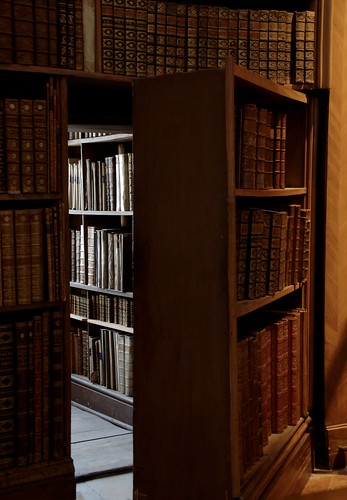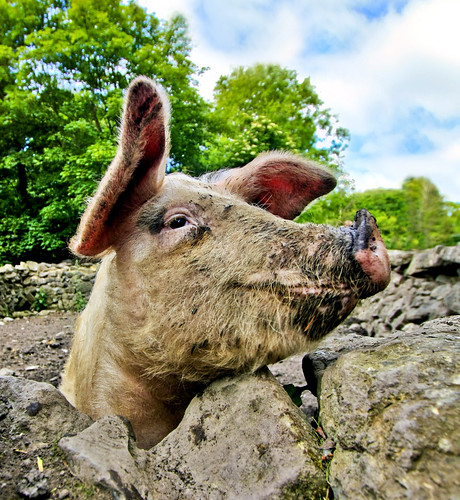There are few pleasures as unalloyed as finding a new author whose books you enjoy – and nothing more calculated to alloy said pleasures as finding that they have inconveniently died and stopped writing; or that there’s a run on their books at the library the week after you find that you like them.
Here, however, are a few (mostly living) mystery authors whose books I have been enjoying of late – when I can get them. In library shelf order, therefore:
Alan Bradley writes the Flavia de Luce novels, of which there are presently six, beginning with The Sweetness at the Bottom of the Pie. Flavia breaks the usual mould of literary detectives by being an eleven-year-old girl from a family of decayed gentility, who has a passion for chemistry – particularly in the area of poisons. She is precocious without being smarmy, and while her emotional reactions are sometimes hidden even from the reader (I know not why), an afternoon spent with Miss Flavia is generally an afternoon well spent.
Simon Brett has at least four series on the go, of which I have sampled three: the Charles Paris series, the Fethering series, and the Blotto and Twinks series. The Fethering ones are my favourites (featuring a retired civil servant and her considerably less uptight next-door-neighbour), although I also enjoy the theatrical milieu of the Charles Paris novels. I really wanted to like the Blotto and Twinks series, starring an upper-class idiot and his brilliant sister, but they fell a bit flat for me: I don’t much care for books that invite readers to mock their characters or their genre.
Duffy Brown also has more than one series on the go, but the one I’ve been reading is the consignment shop series, set in Savannah, Georgia, featuring Reagan Summerside (who starts a second-hand clothes shop in her living room to make ends meet) and her feisty aunt Kiki. Everybody needs an aunt like Kiki, if only to keep life interesting!
Raymond Chandler wrote some of the most classic LA noir/hardboiled detective novels of all time. I wasn’t sure I was going to like his work, since he was so vehemently against the Golden Age mysteries that I love, but I found Philip Marlowe’s voice an enjoyable read. “I gobbled what they called the regular dinner, drank a brandy to sit on its chest and hold it down, and went out on to the main street.”
Carola Dunn has written 22 novels about the Hon. Daisy Dalrymple, an aristocratic writer who marries beneath her (a policeman, my dear!) and is continually getting dragged into other people’s problems, much to her husband’s annoyance. She’s a very relatable person, and it’s nice to have a detective who doesn’t have serious relationship problems, for a change.
Kathy Lynn Emerson writes the Face Down series, which are notable both for having a strong female lead character in Susanna, Lady Appleton (also with a strong analytical interest in poisons) and for being in tune with their Tudor setting. If there’s one thing I can’t stand in a novel, it’s modernity shoved into an ill-fitting historical guise – Emerson doesn’t fall into that trap.
Charles Finch has written seven novels about “gentleman sleuth” Charles Lenox, beginning with A Beautiful Blue Death. The settings are convincing, and I don’t figure out whodunnit (or even exactly what they dun) halfway through and spend the second half saying ‘I thought so’ – always a good sign.
Andrew M Greeley’s detective is a bishop in the Roman Catholic Church – something he knew a lot about as he was himself a priest from 1954 until his death two years ago. He sees both the good and the bad in the church (and outside of it) and Bishop Blackie Ryan has a self-deprecating wit that makes for a very good read. He specializes in locked room mysteries.
Georgette Heyer is best known for her Regency romances, but she also wrote traditional mysteries of the Golden Age ilk. They make for pleasant, light reading. I did guess whodunnit on the first page of one, but that might be due to my nasty suspicious mind. (Suspect everyone.)
Catriona McPherson writes the Dandy Gilver series – Dandy being an upper class woman who decides to set up as a private inquiry agent with a bachelor friend of hers. The books are set in the 1920s and provide a good mix of realism and romp, keeping in touch with current events as they do. Dandy makes very good company on a rainy afternoon.
The honourable mention goes to Ashley Weaver. I found her book Murder at the Brightwell, enjoyed it, and then found that she has so far published only the one (still, better than finding a favourite author has died). It’s the first of a series set in the 1930s and is in the style of the Golden Age (with only occasional lapses). It keeps you guessing all along, which is pretty good for a debut novel. I look forward to seeing her second novel once it comes out in October.
So there you have it: ten (and an extra) mystery authors in whose work I have recently revelled. Enjoy!









